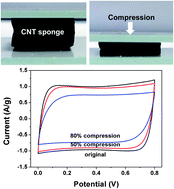Highly deformation-tolerant carbon nanotube sponges as supercapacitor electrodes†
Abstract
Developing flexible and deformable supercapacitor electrodes based on porous materials is of high interest in energy related fields. Here, we show that

* Corresponding authors
a
Department of Mechanical Engineering, Tsinghua University, Beijing 100084, P. R. China
E-mail:
wdh-dme@tsinghua.edu.cn
b Beijing Key Laboratory of Green Chemical Reaction Engineering and Technology, Department of Chemical Engineering, Tsinghua University, Beijing 100084, P. R. China
c
Department of Materials Science and Engineering, College of Engineering, Peking University, Beijing 100871, P. R. China
E-mail:
anyuan@pku.edu.cn
d Key Laboratory for Advanced Materials Processing Technology, School of Materials Science and Engineering, Tsinghua University, Beijing 100084, P. R. China
Developing flexible and deformable supercapacitor electrodes based on porous materials is of high interest in energy related fields. Here, we show that

 Please wait while we load your content...
Something went wrong. Try again?
Please wait while we load your content...
Something went wrong. Try again?
P. Li, C. Kong, Y. Shang, E. Shi, Y. Yu, W. Qian, F. Wei, J. Wei, K. Wang, H. Zhu, A. Cao and D. Wu, Nanoscale, 2013, 5, 8472 DOI: 10.1039/C3NR01932B
To request permission to reproduce material from this article, please go to the Copyright Clearance Center request page.
If you are an author contributing to an RSC publication, you do not need to request permission provided correct acknowledgement is given.
If you are the author of this article, you do not need to request permission to reproduce figures and diagrams provided correct acknowledgement is given. If you want to reproduce the whole article in a third-party publication (excluding your thesis/dissertation for which permission is not required) please go to the Copyright Clearance Center request page.
Read more about how to correctly acknowledge RSC content.
 Fetching data from CrossRef.
Fetching data from CrossRef.
This may take some time to load.
Loading related content
